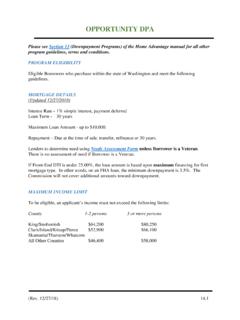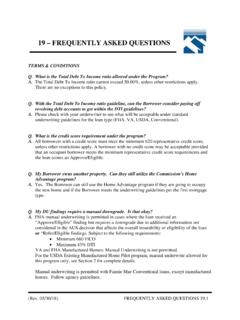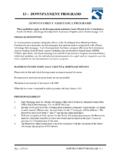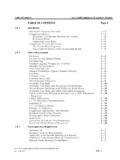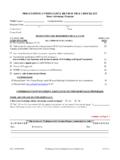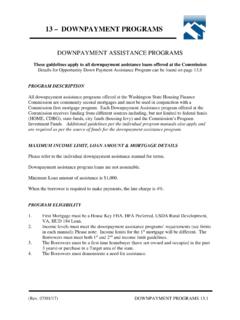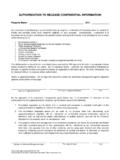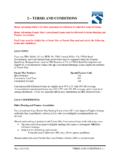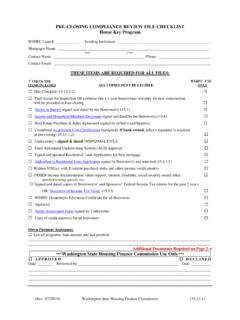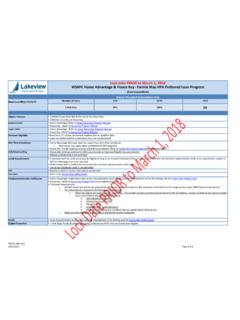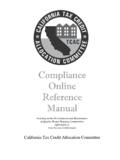Transcription of WASHINGTON STATE HOUSING FINANCE …
1 Rev. January 2018 1 - 27 WASHINGTON STATE HOUSING FINANCE commission TAX CREDIT compliance frequently asked QUESTIONS Revised January 2018 These FAQs are based on WSHFC staff interpretations or understanding of IRS rules and guidance for the LIHTC program. Ultimately, Owners are responsible for making sure their properties are in compliance with all applicable rules and regulations. Owners and managers should consult their tax credit legal counsel for further clarification or specific application to their properties. CERTIFICATIONS & LEASING Overcharging Rent Q: What happens if I accidentally overcharge a resident on their rent? A: If a resident s gross rent (utilities + fees + rent) exceeds the federal ( , 50% or 60%) tax credit maximum rent limit for any month during the reporting year, WSHFC is obligated to issue Form 8823 to the IRS for owner noncompliance. This is still true even if you have promptly notified WSHFC of the problem and corrected the issue.
2 The IRS takes overcharging of rent very seriously. In fact, once a unit is determined to be out of compliance with the rent limits, the unit ceases to be a low-income unit for the remainder of the year. This means that the potential financial repercussions for the owner could be significant. The unit isn t back in compliance until the first day of the next year, even if the owner has already lowered the resident s rent and refunded them any overpayments made. If the owner has overcharged rent on a unit meeting a STATE income set-aside (under 50%), WSHFC will issue a letter of STATE non- compliance and will require the owner to reimburse the resident all overpaid monies. Failure to timely adjust the rent and reimburse the resident could hinder the owner s future applications for credit. Acquisition/Rehab Properties Financed with Tax Credits and Bonds Q: Does it matter when the Owner takes credits, , at closing (for acquisition), at PIS, or the year after PIS?
3 A: The bond closing isn t important. The first year for both the acquisition and rehab credits is the year the rehab is placed in service or, if the Owner elects, the following year. Q: If the Owner takes acquisition credits from bond closing, do the units need to be rent-restricted in addition to being income-restricted and non-transient? A: Yes, if the Owner takes credits from the date of bond closing, the units must be rent-restricted from that date. Q: If the Owner doesn t take acquisition credits until PIS, or the year after, then can the units be income-restricted for qualification only and not rent-restricted until credits are taken? A: There is no guidance about whether units should be rent-restricted prior to the beginning of the tax credit compliance period. However, as a matter of policy, if households are qualified at acquisition, it makes sense to limit the rents at that time as well.
4 Q: Does the Owner initially have to sign six month leases with qualified households? A: Since the Owner is eventually taking tax credits, six month leases must be signed with all qualified households at initial move-in. Only bond-financed properties with no tax credits may initially sign month-to-month leases with their qualified households. Existing households who Rev. January 2018 2 - 27 remain after bond closing do not need to sign new leases. However, they must be tax credit-qualified and sign the commission s Tax Credit Lease Rider. Annual Recertification of Income Q: I m completing recertifications for residents at my property. Do I have to get third-party verification of everyone s income? A: Not after the first lease anniversary. WSHFC requires Owners of 100% income-restricted properties to complete one third-party annual recertification on the first anniversary of the lease.
5 Subsequent recertifications may be fulfilled using the Self-Certification of Annual Income form. Q: Since third party-verified recertifications aren t required after the first recertification, why do I need to get residents to fill out the Self Certification of Annual Income form? A: Each household must complete the WSHFC Self Certification form in order to continue certifying the Student Status of each household member, as well as providing minimal compliance information needed for WSHFC monitoring purposes. The Self Certification form is also used by several other WASHINGTON STATE public funders for purposes of fulfilling their recertification requirements. Q: What happens if I find out at recertification that one of my residents was over-income at the time they moved in to my property? A: If an Owner/Management Company discovers non- compliance they should contact the Portfolio Analyst for the property and let them know what they found and how they plan to correct the non- compliance .
6 In most cases, non- compliance that is found and corrected prior to a STATE agency review does not need to be reported to the IRS as long as it is disclosed and corrected. If any household is discovered to have been over-income at move-in during a WSHFC audit, WSHFC staff will determine the appropriate remedy, which could include reporting the non- compliance to the IRS and/or requiring 100% third-party recertifications to be re-established for a minimum period on all buildings in the project. Q: Is back-up documentation required for self recertifications? A: WSHFC does not require back-up documentation for self recertifications completed after the first anniversary. However, other funders may require documentation to substantiate estimated income. Please check with your other funders. Note: Properties that are allowed to utilize the Self Certification for the first annual recertification (because they are qualified with an IRS issued Recertification Waiver and/or are approved for Post Year-15 Monitoring Procedures) should obtain verification of the start date for any new income source if the household gross income exceeds 140% at the first recertification, or if the household income has increased by a significant degree ( , +10K or more).
7 Q: What does 100% low-income mean? If my property is only partly restricted by WSHFC but all other units are restricted by another public funder, does that count? A: Yes, if the Owner can document that all units are rent and income restricted at or below 60% AMGI, our policy applies. Q: What if my property has market units, but I choose to also limit those units below 60% AMGI? A: If the Owner is willing to amend the Regulatory Agreement, restricting all units below 60% AMGI, this policy will apply. However, amending the regulatory agreement would not result in additional tax credits. The Owner must pay for the recording of the amendment. Rev. January 2018 3 - 27 Q: We manage a 4% tax credit/bond-financed property. Our property is 100% low-income restricted below 60% AMI by our tax credit agreement, but 20% of our units are also bond restricted. Do we need to third-party recertify the bond units every year?
8 A: No. You can follow the rules outlined above for 100% income-restricted properties. Certifying Households after Year 15 Q: Do we still need to recertify households after Year 15? A: That depends on the type of property you manage: 1. If a property has been approved by the commission for Post-Year 15 Monitoring Procedures (see Chapter 11 of WSHFC s Tax Credit compliance Manual) and the property is 100% low-income restricted (60% AMI or lower), then no annual third-party recertifications are required. Each household is still required to annually complete WSHFC s Self-Certification form. 2. If a property has any market units, annual third-party recertifications on all households must still be completed for the duration of the Regulatory Agreement. Certification Effective Dates Q: What is the Effective Date of the initial certification and when is the first recertification due?
9 A: The Effective Date of the initial certification is the same date as the commencement date of the lease. This is the date when a resident can move in to the unit. The income verifications must be dated within 120 days prior to the commencement of the lease. Recertifications can be done up to 120 days ahead of the certification date and must be effective as of the anniversary date of the initial certification date. For example, if a household moves into a unit on April 23, 2015 , their initial certification date is 4/23/15 and their recertification date is 4/23/16 For administrative ease, managers may choose to make recertification dates the first day of the month for residents with move in dates within that month. Example: Mary Smith moves into Greenwood Manor on 10/15/14. Her subsequent recert effective dates can be 10/15 or 10/1 each year. Mike Jones moves into Greenwood Manor on 6/2/14.
10 His subsequent recert effective dates can be 6/2 or 6/1 each year. The key is to ensure that the recertification effective date occurs within 12 months of the previous recertification effective date. Certifying 17 Year Old Residents Q: We have a family applying for HOUSING and one of the household members is 17 now, but will turn 18 within the next 12 months. Do I need to have the 17-year-old complete a Resident Eligibility Application (REA) and get verification of his/her income? A: Yes. Since owners are required to determine anticipated income, any household member who will be an adult (18 year old or emancipated minor) within 12 months of the certification effective date needs to certify their income and assets. Have the 17 year old complete the REA (pages 2, 3, 4) and obtain income verifications to support what s/he puts on the questionnaire. Only count the anticipated income of the 17-year-old for the months after s/he will turn 18.
